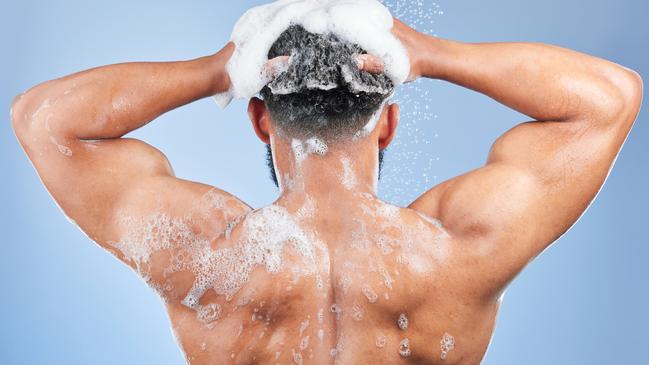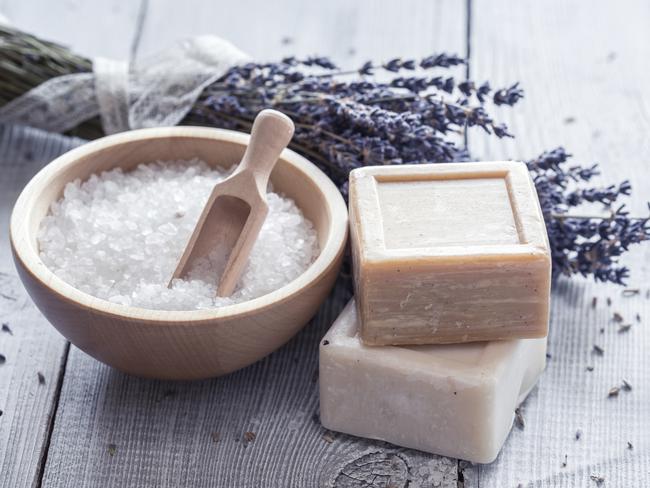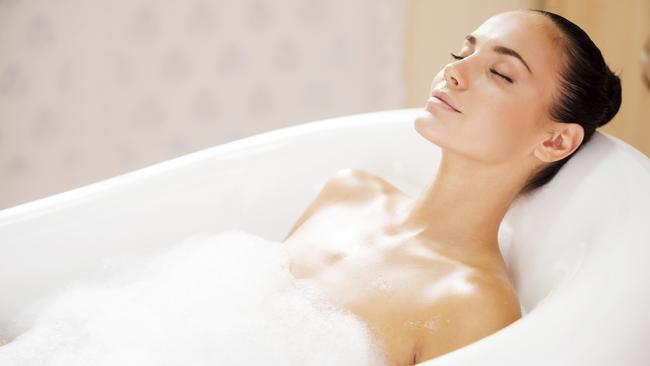Groin grooming? Has cleanliness gone too far?
From soap and shower gels to whole body deodorisers and groin grooming products, the personal hygiene market keeps on growing. What do the experts make of it?

Are you too dirty? Find yourself in the health and beauty aisle of a pharmacy or, worse, stray on to TikTok, and you might well start questioning if your personal hygiene is up to scratch.
Soap, water and a deodorant spray, once the only items needed to keep you smelling fresh, don’t even scratch the surface of what is now considered the bare minimum for cleanliness. Among the products you never knew you needed are the washes, sprays and deodorisers of feminine hygiene ranges, while the male market includes intimate “groin grooming” products. Look away now if this has left you feeling uncomfortable – it gets worse.
We all produce sweat, which is odourless but can become smelly when bacteria in warm, moist body parts collide with the fatty acids, hormones and proteins present in perspiration to generate stinky body odour. But whether or not we need deep cleansing and toning of every part of our anatomy is moot.
“Since 2023 there’s been a massive increase in personal hygiene products that are marketed as an essential for keeping us squeaky clean,” says Michelle Spear, professor of anatomy at the University of Bristol. “We are being sold the idea that somehow we are inherently dirty, which is not based on any sound scientific evidence.”
So how far should we take intimate grooming? Here’s our guide:
Are your pits fresh enough?
Each of us loses an average of 1.5 litres of fluid a day through perspiration, a tenth of a teaspoon coming from the armpit. “Apocrine sweat glands in our armpits push out protein-rich sweat, which is initially odourless but which, left hanging around, is broken down by bacteria on our skin,” Spear says.
“It is the breakdown products that give rise to an unpleasant underarm odour.”
The more you sweat, the greater the build-up of bacteria and the more likely you are to have stinky armpits, although a study published in the Journal of Investigative Dermatology found that 2 per cent of women carried a rare genetic variant, known as ABCC11, meaning they didn’t produce underarm body odour.
Teenagers have particularly active sweat glands. “Adolescent body odour is the consequence of an increase in hormones during puberty, which results in a rise in oil production as well as increased sweating,” says Dr Zainab Laftah, consultant dermatologist at HCA The Shard Hospital. “The rapid multiplication of bacteria in the presence of oily sweat and the breakdown of sweat into acids gives rise to unpleasant smells.”
There are two main choices when it comes to products designed to tackle smelly underarms. Deodorants usually contain ethanol or an antibacterial agent to break down bacteria and perfume to hide odours, but don’t prevent wetness. Antiperspirants, which often contain the active ingredient aluminium, temporarily block pores to help protect against sweating and odour. “There’s no right or wrong choice and it comes down to personal preference,” Spear says. “For most of us, keeping the underarms clean and wearing sweat-wicking fabrics that don’t hold moisture is key.”

Shower gels or bar soaps?
Old-school bar soaps are typically made from plant or animal fats sometimes with added essential oils, and contain fewer chemicals than shower gels. But which works best?
“Both soap bars and body washes are very effective at removing surface dirt and oil,” Laftah says. “The choice between the two should be guided by your skin type.”
She says traditional block soaps often have a higher pH than the skin’s natural pH, which can disrupt the skin barrier, leading to dryness and irritation if you have dry skin.
“Shower gels and liquids typically also contain some moisturising agents such as glycerin and oils, which can help to maintain the skin’s natural moisture balance,” she adds. “But be cautious, as many body wash formulations are also highly fragranced or contain preservatives such as parabens and sulfates, which can irritate sensitive skin.”
Do you look after your feet?
One area of the body we are not great at keeping clean is our feet. With 250,000 sweat glands, our feet have more per inch than any other part of the anatomy and can produce up to half a pint of sweat a day.
“The eccrine sweat glands in our feet release mostly water-based sweat, which helps to cool the feet,” Spear says. It is when our feet are cocooned in moist, warm environments of socks and shoes that bacteria breaks down sweat to produce smelly compounds.
A foot antiperspirant is not necessarily the answer, though. Such products are designed to stop sweating and could lead to excessive dryness of the skin on your feet. “Our feet do need some moisture to keep the skin supple as when skin dries out it cracks and can become painful,” Spear says.
“Those cracks on the feet can also harbour fungi and bacteria, which lead to infections such as athlete’s foot.” What is essential is daily washing of the feet to prevent odour. Standing in the shower allowing soapy water to rinse over your feet is not enough.
“You need to reach down and wipe or scrub feet in the shower, rinsing off soapy residue that gathers in the bottom of the shower tray,” says Emma McConnachie, a consultant podiatrist and spokesperson for the Royal College of Podiatry. “Washing your feet daily with an antibacterial soap is ideal, making sure you dry thoroughly between the toes to prevent a build-up of bacteria.” Finish with an absorbent foot powder or cream, available from pharmacies, if your feet are prone to sweating.
Whole body deodorisers – the new essential?
According to the Global Cosmetic Industry online searches for “whole body deodorants”, which are mostly deodorants rather than sweat-blocking antiperspirants, have exploded in the past two years. Products such as AKT’s Whole Body claim to help deal “with a sweaty back or chest” and “even butt sweat”, while Dove’s Men+Care’s Whole Body Deo, available online, offers relief “from pits, privates, to feet”.
For women, there is Luna Daily’s The Everywhere Spray-to-Wipe Fragrance Free, a cult product made with natural ingredients that are designed to be sprayed or wiped into all the smelly areas, including the vulva, sweaty under-boob, thigh creases and underneath the butt folds.
“The idea is that they take care of smells in any region beyond the armpit,” Spear says. “But our bodies are finely tuned at self-regulating odour and the emergence of these products as a trend just creates more anxiety that we are all too smelly.” So we don’t need them? “Absolutely not.”
Is ‘groin grooming’ a thing?
Anyone with a male teen or twentysomething in their family home may well have bathroom cabinets bulging with products designed to tackle “below-the-belt’‘ grooming issues. Basic essentials include anti-chafing ball deodorants, groin cleansers and “ball sprays”, and an array of groin wipes and lotions that promise to keep the area clean.
A company called Nutcare produces a Smooth Nuts Anti Wrinkle Moisturising Cream that “nourishes men’s scrotum skin”; Manscaped offers a subscription service to its bewildering array of products, including a Crop Preserver “ball toner and refresher” and a “ball aftershave lotion”. Is any of it necessary?
“The scrotum has a thermoregulatory role and is equipped with eccrine sweat glands that release sweat through ducts on the skin to keep the area cool,” Spear says. “Scrotum sweat is typically odourless and you don’t need special products to control it.”
The skin around the penis and scrotum is “particularly delicate”, Spear says, so fragranced scrubs and sprays can irritate some men. “Yes, men do need to keep the area hygienic with regular washing and thorough drying,” she says. “And try to minimise trapped moisture, which can cause fungal infections, by wearing breathable fabrics. But you don’t need to spend a fortune on intimate grooming.”

Should women use intimate wipes?
Gwyneth Paltrow introduced us to the concept of vaginal steaming, also called yoni or V-steaming, the intimate “detoxifying” treatment that carries unfounded claims of revitalising the uterus and vagina, improving everything from fertility to pre-menstrual symptoms.
From there the feminine hygiene market has evolved to include myriad intimate wipes, sprays and deodorants that Spear describes as “at best totally unnecessary and at worst damaging to the very delicate vaginal pH that is easily disrupted by overly fragranced or highly chemical products”.
In fact, Spear says, the female vagina is effectively “self-cleaning and has an impressive ability to naturally maintain its own pH balance and levels of beneficial bacteria” without the need for expensive products.
“For many women these feminine wipes and washes do more to disrupt vaginal status quo than they do to help it,” she says. “Vaginal tissue is a delicate mucus membrane that is not at all dissimilar to the lining of the cheek, and exposing it to scented and harsh products can result in unwanted infections and irritation.”
Externally, the vulval area is exposed to sweat, urine and natural body oils, so you do need to wash gently with warm water and mild soap daily. “You do need to clean intimate areas daily,” Spear says, “but you do not need special products to do it.”
Should we let pubic hair grow?
Women have long attended to the bikini line for cosmetic reasons, but now men are using razors to remove body hair, including from their groin area. Gadgets such as Manscaped’s bestselling The Lawn Mower 5.0 Ultra groin trimmer and Gillette’s Intimate pubic hair and balls trimmer are among the market leaders. If you are wary about wielding a razor down there you could opt for Nutcare’s Barenuts Hair Removal Cream or Veet’s Men Total for “sensitive areas”.
Is it necessary for any of us? “Pubic hair is there to protect the delicate skin in those areas and to keep you clean,” Spear says. “It traps dirt and discharge to help prevent infections and removing it does not make you more hygienic.”
Removing pubic hair is not right or wrong, she says, but don’t do it solely because you think it is a positive health choice, because it’s not.
The Times



